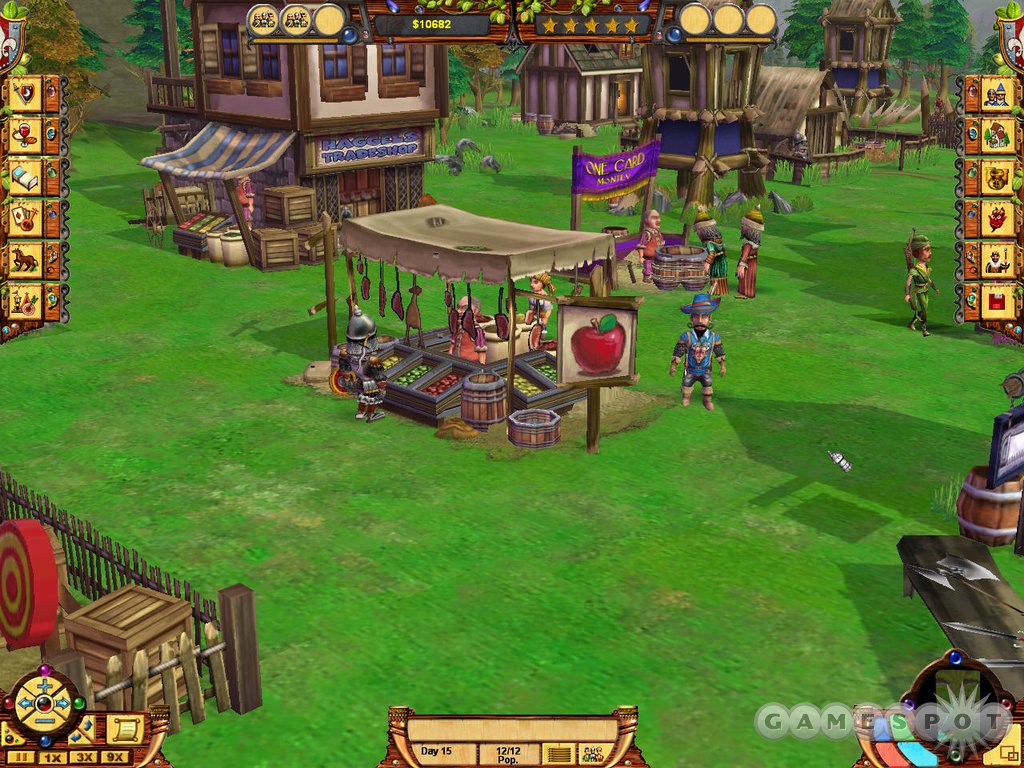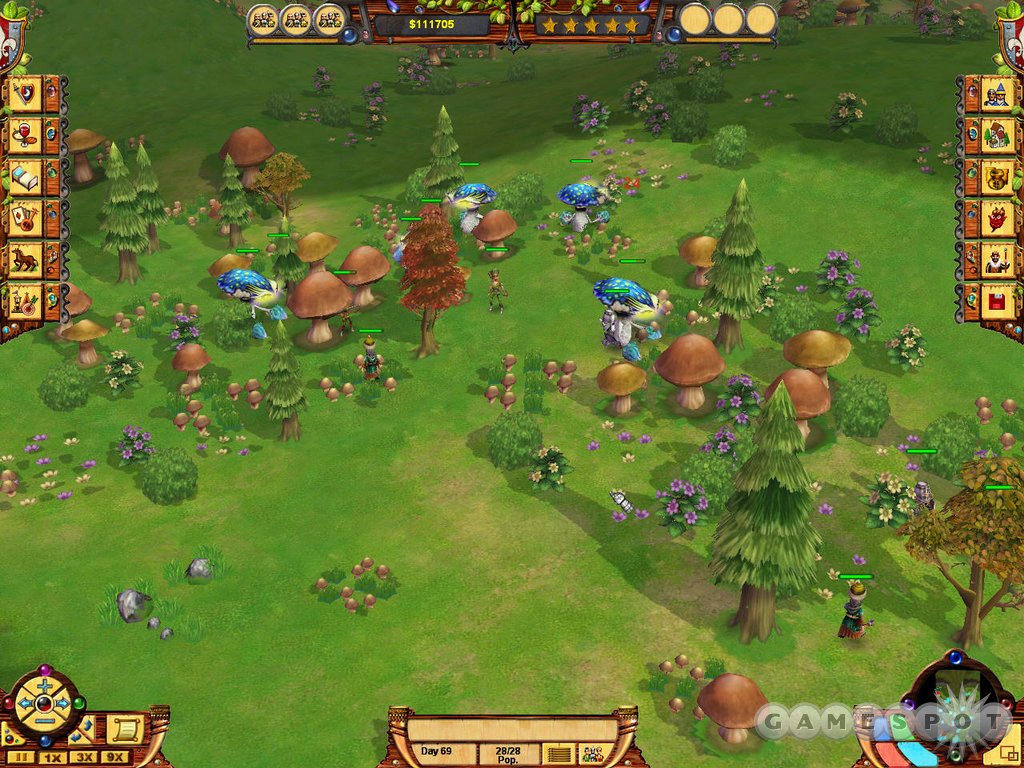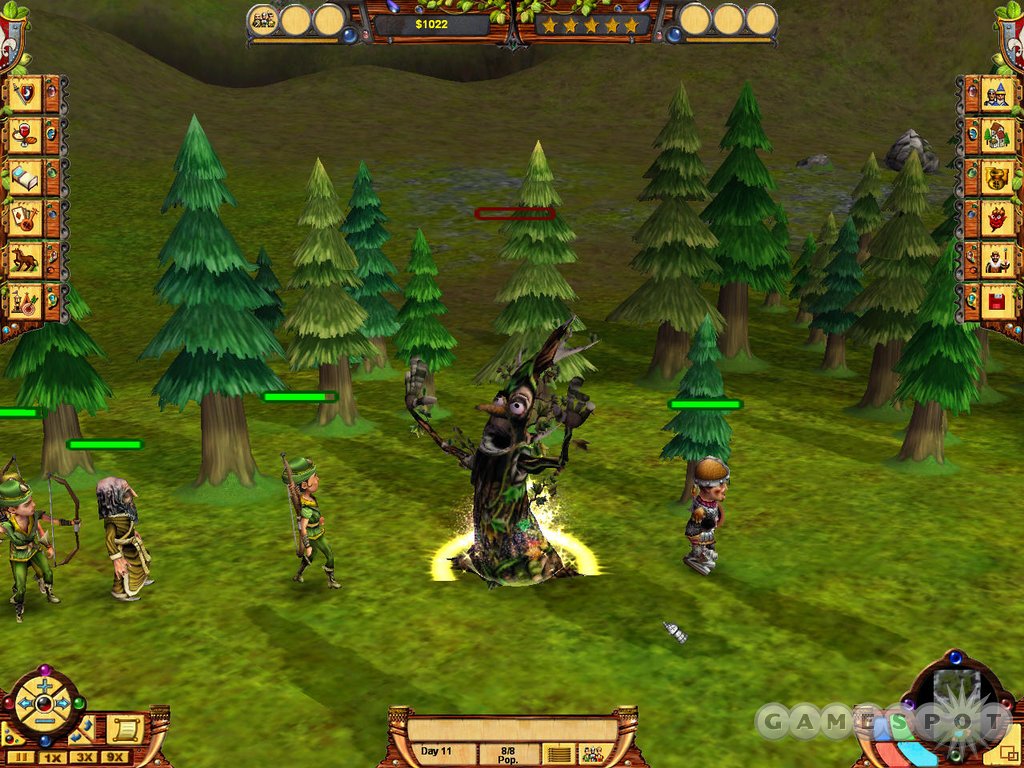It's no exaggeration to say that the real-time strategy genre and, in particular, the fantasy-themed real-time strategy genre are both full of clichés. For example, in most real-time strategy games, you have to defeat an ultimate evil from taking over the world by battling hordes of nightmarish monsters while overcoming desperate odds. To its credit, Medieval Conquest is not one of these games, and instead delivers a refreshing blend of economic strategy and amusing gags at the fantasy genre's expense.

The first thing to note about Medieval Conquest is that it's not a traditional real-time strategy game. Rather than gathering lots of resources and churning out huge armies, you instead must build and manage a fantasy economy that will support the heroic adventurers who are battling evil. In other words, Medieval Conquest is a bit like a tycoon strategy game--but with fantasy elements. In fact, it's very much like Cyberlore Studios' cult favorite, Majesty: The Fantasy Kingdom Sim, though developer Cat Daddy Games takes the innovative concept of that game and expands on it further.
In Medieval Conquest, you're hired by the king of a besieged fantasy kingdom to clear out all the monsters and evil creatures that are roaming his land. To do so, you must hire three different classes of adventurers--fighters, rangers, and mages--and then group them into adventuring bands. These adventurers operate autonomously, so all you need to do is direct them where to hunt, and they'll automatically go off to slay any monsters they encounter. In the meantime, you must provide the buildings and services that these adventurers require. You receive a bounty from the king for each monster your adventurers kill, and you reinvest the money earned by building armories where your adventurers can buy better weapons and equipment, establishing inns and taverns where they can rest and eat, providing carnivals and other amusements to keep them happy, constructing training centers where they can learn new skills, and assembling other such buildings. Failure to provide these goods and services will discourage your adventurers, so they may desert you for the next monster-infested kingdom.
There's a strong role-playing element in the game, even though you don't actually control any of your characters directly. You'll find yourself nurturing your adventurers along as they rise in rank, so there's a certain amount of satisfaction in seeing your adventurers pack the latest gear that you've stocked in your shops.

You'll always have plenty of stuff to construct, even after you've built a huge town with all the shops and services that your adventurers need. That's because each level of Medieval Conquest is huge enough to offer multiple objectives. Your adventurers will spend a lot of time walking around the world, but, luckily, you can construct outposts that serve as fortified oases in the wilderness. More importantly, each outpost comes with a road that you can use to connect distant corners of the kingdom. Adventurers not only move twice as fast on roads, but also they can purchase mules and horses (at stables that you build) to get around much faster. And, finally, you can put up buildings next to outposts. This lets you put up tiny hamlets and villages all over the map, further cutting down on your adventurers' travel times, because they won't have to travel all the way back to the main town to relieve their boredom or to get something to eat.
What makes Medieval Conquest shine is how it wraps all its gameplay elements up in a lighthearted rendering of fantasy life. Like the Shrek movies, Medieval Conquest packs a lot of sly humor and puns, from its blacksmith shop, with its tiny "Smith and Weapons" sign, to its comical monsters. While you'll run into some conventional fantasy foes, such as a dragonlike creature that will occasionally burn down a building, you'll also battle what look to be giant purple ladybugs, killer rabbits, and a "mad" troll--everyone says the creature's mad because of his behavior, since he frolics in a wooded thicket like a 4-year-old girl. Meanwhile, the game's audio will also make you smile, particularly with the one-liners that your adventurers spout. It's fun to hear a fighter proudly proclaim, "I have defeated thee," after slaying a feeble opponent. Likewise, it's fun to hear the whimsical death gurgles of some of the stranger creatures in the game.
The art direction is rather unconventional, but it works well within the overall context of the game's humor. Your adventurers look like animated bobblehead dolls, with heads that are far out of proportion from their bodies (as if to emphasize their cartoonlike natures). The rest of the world is brightly colored and lit, and it features a lot of little details, like flies that buzz around some of the less savory eating establishments. You can use the camera to zoom down to appreciate all this detail, or you can zoom out for a more traditional, bird's-eye view of the action.

Medieval Conquest is beset with a few problems, despite its pleasant overall appearance. The game's got a relatively steep learning curve that's not helped by the meager tutorial that consists of pop-up screens. Meanwhile, some of the pathfinding and artificial intelligence decisions are, at times, a bit dubious--it can be frustrating to watch your adventurers run off to engage a distant threat while ignoring a nearby monster who's busy tearing apart one of your buildings. Finally, the developer made the mistake of giving you everything up front in the first level, so there's little to unlock or to discover in further missions. This leads to a sense that you've seen most everything in the game early on, which leads to a slight feeling that you're repeating the same process over and over again.
Still, those flaws don't detract that much from the fun of Medieval Conquest. Cat Daddy Games could have played it straight by making a serious game about good battling evil, but, instead, it hit just the right tone of humor and action. As a result, Medieval Conquest is a lighthearted, charming blend of real-time strategy, tycoon-building, and role-playing elements that form a game that knows not to take itself too seriously.